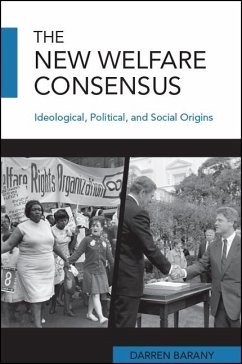Winner of the 2019 Paul Sweezy Marxist Sociology Book Award presented by the Marxist Section of the American Sociological Association
Families on welfare in the United States are the target of much public indignation from not only the general public but also political figures and the very workers whose job it is to help the poor. The question is, What explains this animus and, more specifically, the failure of the United States to prioritize a sufficient social wage for poor families outside of labor markets? The New Welfare Consensus offers a comprehensive look at welfare in the United States and how it has evolved in the last few decades. Darren Barany examines the origins of American antiwelfarism and traces how, over time, fundamentally conservative ideas became the dominant way of thinking about the welfare state, work, family, and personal responsibility, resulting in a paternalistic and stingy system of welfare programs.
Families on welfare in the United States are the target of much public indignation from not only the general public but also political figures and the very workers whose job it is to help the poor. The question is, What explains this animus and, more specifically, the failure of the United States to prioritize a sufficient social wage for poor families outside of labor markets? The New Welfare Consensus offers a comprehensive look at welfare in the United States and how it has evolved in the last few decades. Darren Barany examines the origins of American antiwelfarism and traces how, over time, fundamentally conservative ideas became the dominant way of thinking about the welfare state, work, family, and personal responsibility, resulting in a paternalistic and stingy system of welfare programs.
Dieser Download kann aus rechtlichen Gründen nur mit Rechnungsadresse in A, D ausgeliefert werden.









